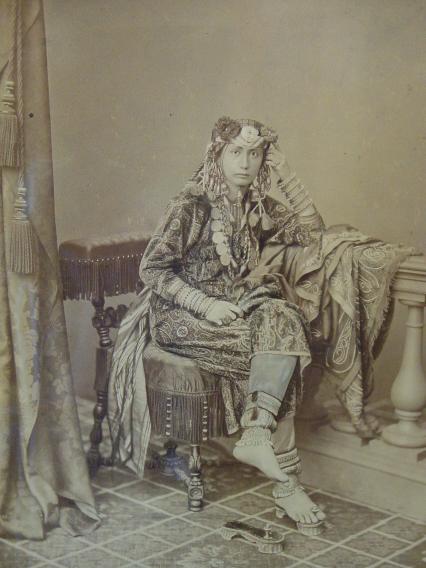Growing up in Stonetown
Let’s begin the story with the 1001 nights entry: “Once upon a time in a far far away land, a princess was born, Salme bint Sa’id ibn Sultan was her name!”.
This intriguing picture of Salme, dressed in original Zanzibar clothing, was taken in Hamburg ca. 1868, and not in Zanzibar. The original 19th century albumen print, gold layered in a silver layer, of Princess Salme can be found at the entrance of the NINO library in its original wooden frame ever since the cabinet was moved here in 1990.
Salme was born of royal blood in Zanzibar in 1844 as the daughter of the ruler of Oman and Zanzibar, Sultan Sa’id bin Sultan al-Busaid (1791-1856) and his Circassian slave Jilfidan. She was destined to spend her life in a harem in Stonetown until her fate changed during her early teens. Being the daring and adventurous girl she was, she became involved in political intrigues between her brothers after the death of her father in 1856 which complicated her position within her family. The ultimate break with tradition came in 1865, when she met the German trader Heinrich Rudolph Ruete (1839-1870), who was part of the foreign diplomatic and trading community living in Stonetown. She became pregnant and was forced to elope with him in 1866 to escape the wrath of her family.
In Aden she converted to Christianity and became Emily Ruete. She lived in Hamburg with her husband and three surviving children, Antonie (1868), Said (later named Rudolph Said-Ruete, 1869) and Rosalie (1870), until disaster struck and Heinrich died in a freak trolley car accident in 1870. After this, the life of the small family was tragic and eventful. Poverty and coping on their own in the patriarchal and prejudiced society of 19th century Germany forced them to move frequently between cities in Germany and abroad (e.g. Köln, Rudolstadt, Berlin, Jaffa, Beirut) for short or longer periods. Salme’s attempts to reconcile with her family in Zanzibar had been unsuccessful, although she visited Zanzibar twice: once in 1885, with the help of Bismarck who intended to use her and Rudolph as a pawn in German East Africa politics (to no avail), and in 1888. She died in Jena and was buried in Hamburg in 1924.
A true heroine, she lived her life as an outsider, alone and a sole provider, torn between Islam and Christianity and between countries. In remembrance of her there is a small museum in Zanzibar (Princess Salme Museum at Emerson on Hurumzi) and a heritage walk along all places connected to her in Stonetown.

